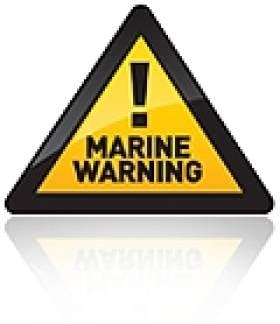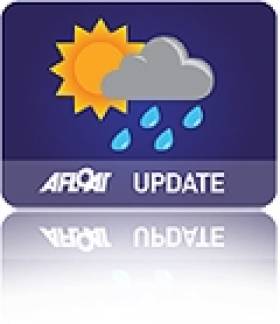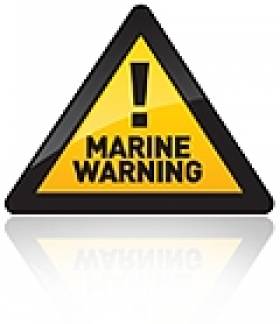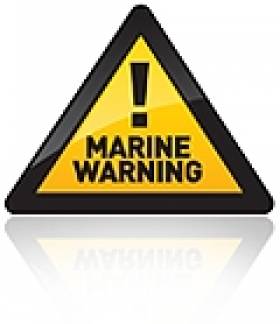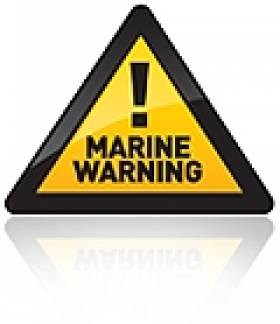Displaying items by tag: marine warning
Marine Notice: Hydrographic Survey in Irish Sea
#MARINE WARNING - The latest Marine Notice from the DTTAS advises all seafarers in the Irish Sea between north Dublin and north Wales to give a wide berth to the hydrographic and oceanographic survey operation in the area this week.
The SV Bibby Tethra (callsign 2EGF8) commenced survey operations yesterday (Monday 16 January) from offshore at North Beach in Rush to approximately 16 miles offshore north of Anglesey. The survey is scheduled for seven days, subject to weather delays.
The vessel will operate on a 24-hour basis, displaying appropriate day shapes and lights during survey operations, and will transmit an AIS signal. The vessel will be keeping a listening watch on VHF Channel 16 at all times during the operations.
Survey operations will involve towing survey equipment up to 100m astern of the vessel along pre-defined survey lines, which will restrict the vessel’s ability to manoeuvre.
Details of the survey area are included in a PDF of Marine Notice No 2 of 2012, which is available to read or download HERE.
Gale, Flood Warning In Effect for Ireland Today
#WEATHER - Met Éireann is warning that more gale force winds will affect many parts of Ireland and the Irish Sea today (28 December).
According to the forecaster, stormy conditions over Connacht, Ulster and parts of north Leinster will see gale force westerly winds with gusts of between 100 and 130 km/h.
The worst winds are expected in exposed coastal and hilly areas of Ulster and Connacht. There is also an increased risk of flooding as a result of high astronomical tides combined with very high seas.
Warning To The Public - October 2011
On Monday 10th October 2011 from 09.00hrs to 18.00hrs
At GORMANSTON, CO. MEATH
IT IS DANGEROUS FOR PERSONS, SHIPPING, LIVESTOCK OR AIRCRAFT ETC., TO BE WITHIN THE DANGER AREA WHILE FIRING IS IN PROGRESS.
The DANGER AREA comprises the lands of GORMANSTON CAMP and the air and sea area contained within a circle having a radius of 3NM (5.4KM) centred on GORMANSTON CAMP with an additional area contained within the segment centred on GORMANSTON CAMP and bearing 015° T, through MOSNEY RAILWAY STATION and 106° T through GORMANSTON RAILWAY STATION seaward for the distance of 10NM (18.5 KM) The DANGER AREA extends from SEA LEVEL to a height of 12,000ft.
RED FLAGS will be flown at BEN HEAD and GORMANSTON RAILWAY STATION when exercises are taking place.
OBJECTS found on the RANGES may be HIGHLY DANGEROUS and the PUBLIC ARE WARNED of the risk of handling or interfering with such objects.
NO REWARD of any kind will be made for the finding of objects of a military nature on the ranges.
MICHAEL HOWARD
SECRETARY GENERAL
DEPARTMENT OF DEFENCE
Warning Issued Over Inflatable Toys Being Swept Out to Sea
Coastguard Sector Manager George Crumpler says,
"Inflatable boats and toys can be great fun, but we'd rather that you used them in swimming pools than at the beach. If you do use one at the beach, tether it to an adult and never use it in an offshore wind. Inflatables can easily be blown out to sea and, overturn.
Make sure that children are properly supervised. We deal with lost children every year and it can be distressing for children and adults alike. Try to go to a lifeguarded beach if you can and stay within the flagged area.
"Remember to check the weather and the tide times (these can often be found at the entrance to the beach) so that the tide doesn't take you by surprise or cut you off.
"If you see anyone in difficulty, tell the lifeguard if one is available or call the Coastguard on 999.
Remember to have a great time and return home safely."
If you want to prepare for your day out on the coast, you might like to visit Directgov for Kids where there are games and activities for children. Visit http://kids.direct.gov.uk/ and click on the world, then go to the 'watch station' in the 'places' icon.
With the school holidays fast approaching, NI Coastguards are encouraging children to stay safe whilst at the beach and along the coast.
Last month, Northern Ireland Coastguards dealt with a number of incidents that involved young people being overwhelmed by the power of the sea or being cut off by the tide. Some young people have attempted to swim to islands but have underestimated the strength of tides and the distance that they need to swim.
The Coastguard would like to encourage young people to stay within their depth and to check tide times before they arrive at the beach.Coastguard Sector Manager Gordon Munro says,"We'd like everyone who visits our coast to have a great time.
So before you go check out the weather and the tide times (these can often be found at the entrance to the beach).
That way you can ensure that the tide doesn't take you by surprise and that you don’t get cut off."Inflatable boats and toys can be great fun, but we’d rather that you used them in swimming pools than at the beach. If you do use one at the beach, make sure that it is tethered to an adult and never use it if there is an offshore wind. Inflatables can so easily be blown off shore, then overturn.Make sure that children are supervised properly by adults.
We deal with numerous cases of lost children every year and it can be very distressing for children and adults alike.Try to go to a lifeguarded beach if you can and stay within the flagged area.If you notice that someone is in difficulty, either alert the lifeguard if one is available or call the Coastguard on 999.Finally, have a great time and return home safely."If you want to prepare for your day out on the coast, you might like to visit Directgov for Kids where there are games and activities for children. Visit http://kids.direct.gov.uk/



























